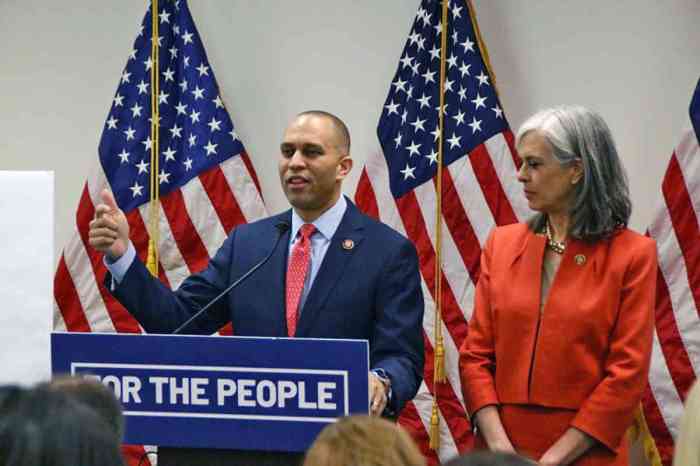Immigrant children have been ripped from the arms of their parent’s arms and detained in cages at our borders. Muslims have been effectively banned from entering America from certain countries. Businesses have been given autonomy to determine if they want to serve LGBTQ couples. NFL players have been villainized as unpatriotic “sons of bitches” for peacefully and silently protesting police injustice. And black bodies continue to be abused and discarded by those meant to protect us.
Make no mistake about it, Republicans are engaged in a dangerously divisive culture war, and Democrats are (possibly too) late to the battlefield. The culture war is going to be amplified in the upcoming Supreme Court confirmation challenge for Brett Kavanough who, if confirmed, could tip the scales of justice on each the aforementioned issues. And the culture war will be a central theme of the upcoming midterm election, in fact it could determine the outcome of the election.
Both Democrats and Republicans have made strategic calculations to determine their positions in this ongoing culture war. Republicans have determined that the benefit of uniting their base toward victory is worth the cost of dividing the country into chaos. Subsequently, Democrats have made the calculation that they have a better chance attracting swing voters back into their coalition, if they avoid identity politics in exchange for exclusively focusing on economic issues.
There are just a few problems with such a fool-hearted and coldly calculated decision for Democrats to avoid the culture war:
There are more of us than there are of them. Demographics are destiny, and they tell us two things about our political future – millennials are officially the biggest voting bloc in America, and this country will be majority-minority in the next 20 years. The battleground states, where elections are won and lost, are significantly younger and diversifying astronomically faster. These two emerging electorates create tremendous strategic opportunity for Democrats, if they get this pivotal moment right.
CNN Exit Poll Data 2016* Minority Votes Youth Voters
% of total Votes % of Dem Votes % of total Votes % of Dem Votes
Florida 38% 56% 17% 19%
South Carolina 26% 54% 18% 19%
Georgia 40% 72% 18% 25%
Recent national opinion surveys have concluded that the top three qualities that voters are seeking in candidates this cycle are someone they can trust, someone that will fight for what they believe in, and someone who will do the right thing. If Democrats could increase the turnout of younger and minority voters by fighting for us, then they actualize the blue wave that they are hoping for in November.
Recommendation: Democrats should take a bold moral stand when the values, issues, and the very identity of their most critical voters are under attack.
It undermines Democrats’ most cohesive message in the midterm…they should have control of Congress in order to check Trump’s power. Last week, I conducted a series of battleground focus groups with millennials and minority voters that all had low-to-mid vote likelihood in the upcoming midterm election. The most shocking discovery: these voters do not believe that Democrats would (and to varying degrees could) check Trump’s erratic and divisive behavior, even with the majority.
Many Democrats, myself included, had taken it as forgone conclusion that the check and balance power of a Democratic-controlled Congress would be a compelling reason to attract voters in November. But if Democrats have not been seen aggressively fighting back against Trump’s most dangerous and divisive actions now, then why should voters trust them to do it with a majority in Congress?
Recommendation: Democrats should take a note from our allies in the parliamentary system where the role of the minority party is to oppose, not merely campaign to become the majority. Opposition requires action.
White swing voters hate racism, too. Standing up to racism and intolerance is popular amongst the majority of Americans, even white Americans. Seventy six percent of Americans support a pathway to citizenship. Sixty seven percent believe separating parents and children at the border is unacceptable. Sixty seven percent support marriage equality for LGBTQ couples. Sixty one percent believe African Americans are more likely to be mistreated by law enforcement. Taking a stand on these issues affecting minorities who are under constant attack is not only the right thing to do, it is the politically prudent thing to do.
A political messaging project, which I recently conducted with Demos, found that language that boldly addresses racial inequalities in an attempt to unite us is more effective than racially agnostic language that is tone deaf to social context. The project concluded that Democrats discussing economic issues absent of race and class leads to less votes than confronting the issues head on.
Recommendation: Democrats should employ the weapons of unity and inclusion as aggressively as Republicans have employed the weapons of division and animosity. No reason to be bashful about it, they certainly are not.
At some point, political expediency must concede to just doing the right thing. Even if it was not the most strategic political decision, although I think we have proven that it is, standing against bigotry and racism is just the right thing to do. Political power in this country swings back and forth like a pendulum. We win some and we lose some. However, despite our overwhelming shortcomings, America has strived to become a moral compass to guide the world. If Democrats concede this culture war by choosing not to engage, then we risk losing something far more important than an election. This is a fight for the conscience of America, and that is one we cannot afford to lose.
Recommendation: Democrats, do the right thing.
To be fair, this is not the beginning, and unfortunately likely not the end, of the culture war forged through our two-party political system. In fact, Donald Trump’s Make America Great Again campaign shares the exact same tenets of Senator Barry Goldwater’s Southern Strategy of the 1950’s – mobilize white voters against the progress made by minorities.
The biggest difference between Republican efforts in the 1950’s and their efforts today is that Democrats took a moral stand, and won. When Lyndon Johnson signed the Civil Rights Act of 1965 he famously declared “there goes the South for a generation,” an acknowledgment of the millions of votes he had conceded in the pursuit of civil rights and justice.
Today, America is being faced with the same moral crisis. Demographic shifts and advancements of minorities are once pressure testing the cohesion of our diverse society. Democrats have an opportunity to defend the morals and values of this country from those who wish to oppose them, both domestic and abroad. This time it might also be their only chance of winning the next election.
Terrance Woodbury is an analyst at Brilliant Corners Research and Strategies where he conducts market research, including focus groups and public polling, that help candidates and companies target and communicate with diverse audiences. Terrance’s research focuses on millennial and minority audiences who have become the driving force of rapidly evolving consumer and electoral trends in both the United States and abroad. Most recently, Terrance has conducted research for candidates in local, state, national, and international elections and for innovative companies such as Uber and Google.


















